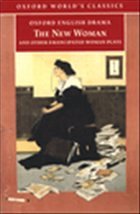Female emancipation and the much derided `New Woman' was a subject of immense fascination in the English Theatre of the 1890s. Associated issues of women's education, freedom of thought, the sexual double standard, and the right to self-determination feature in play after play of the period. However the advent of the New Drama after the turn of the century marked a change of emphasis and figures previously demonized were now heroized. This collection includes two plays from the 1890s, Sidney Grundy's The New Woman (1894) and Arthur Wing Pinero's The Notorious Mrs Ebbsmith (1895), both much mentioned in recent criticism but neither available, until now, and two of the liveliest examples of the New Drama, Elizabeth Robins's Votes for Women (1907) and St John Hankin's The Last of the De Mullins (1908).
Female emancipation and the much derided `New Woman' was a subject of immense fascination in the English Theatre of the 1890s. Associated issues of women's education, freedom of thought, the sexual double standard, and the right to self-determination feature in play after play of the period. This collection includes two plays from the 1890s, Sidney Grundy's The New Woman (1894) and Arthur Wing Pinero's The Notorious Mrs Ebbsmith (1895), both much mentioned in recent criticism but neither previously available, and two of the liveliest examples of the New Drama, Elizabeth Robins's Votes for Women (1907) and St John Hankin's The Last of the De Mullins (1908).
Female emancipation and the much derided `New Woman' was a subject of immense fascination in the English Theatre of the 1890s. Associated issues of women's education, freedom of thought, the sexual double standard, and the right to self-determination feature in play after play of the period. This collection includes two plays from the 1890s, Sidney Grundy's The New Woman (1894) and Arthur Wing Pinero's The Notorious Mrs Ebbsmith (1895), both much mentioned in recent criticism but neither previously available, and two of the liveliest examples of the New Drama, Elizabeth Robins's Votes for Women (1907) and St John Hankin's The Last of the De Mullins (1908).

